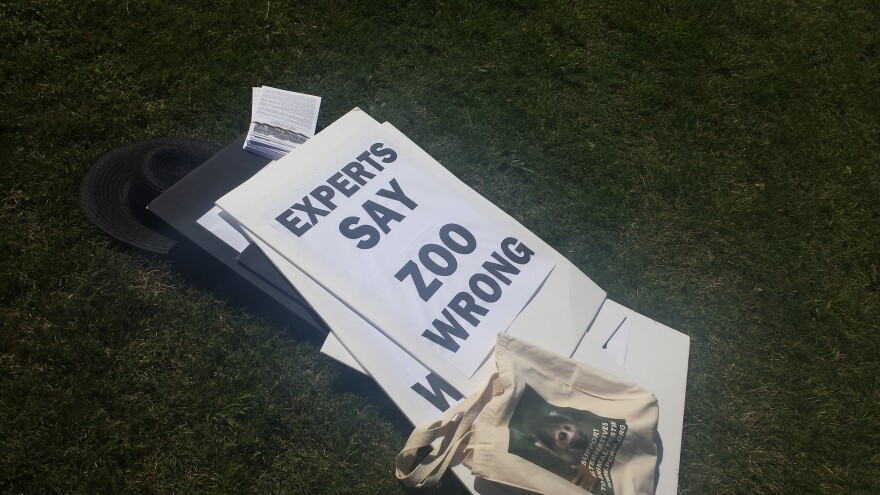The Dallas Zoo welcomed five new elephants last month as part of an import from Swaziland. They’ve just finished their mandatory quarantine, and staffers are preparing them for their public debut.
But animal rights activists are outraged that the zoo went forward with the move and are working to prevent future imports.
How exactly do you move a bunch of elephants from Africa to the Dallas Zoo? First, you have to sedate them and place them in custom-built crates. Then you load them onto a specially-designed 747 and fly them to Fort Worth’s Alliance Airport. Finally, you have a SWAT convoy escort them on 18-wheelers.
Dallas Zoo President Gregg Hudson said the elephants are getting used to their new home.
"They’ve bonded very quickly with their keepers," he said. "We’ve been careful about making sure that we get their diets regulated. But they’ve gotten their energy back, they’re gaining weight. Most of them have put on 100 pounds already, and we’re excited to get them down and integrated into Giants of the Savanna."
Zoo staff will spend the next month introducing the new elephants to the Savanna habitat. Mililo, Zola, Amahle, Nolwazi and Tendaji will be transitioning from their 15,000-acre reserve in Swaziland to just six acres at the zoo. They’ll also need to meet and get along with the four elephants already here -- nicknamed the Golden Girls.
"Just like people they’ve all got different personalities. These animals are so smart, and so intuitive, and they really will tell you when things aren’t going well and when they’re not comfortable with the situation," Hudson said.

First, the elephants will smell each other, hear each other and get a sense of each other in separate pens. If that goes well, they’ll get to hang out in the same space. Throughout this slow process, keepers will observe and monitor their behaviors around the clock.
"The great thing about Giants of the Savanna is that it's got so much flexibility with multiple habitats, so we can actually manage three or four different kinds of groups within the exhibit itself," Hudson said. "Do different pairings and mix up the combinations of the elephants."
The Dallas Zoo elephants are among 17 that were imported from Africa last month. The others were sent to zoos in Wichita, Kansas, and Omaha. U.S. Fish and Wildlife approved the import in January, which was part of a conservation project that sought to save 18 elephants from worsening drought conditions in Swaziland. One of them died before the trip from gastrointestinal issues.
Officials in Swaziland say there isn’t enough food and water for the elephants, and that the animals are actually overcrowding and depleting resources needed by endangered rhinos. Compounded with aggressive poaching in nearby countries, Africa has become unsafe for elephants, officials say. If the 17 elephants weren’t imported, they would have been culled.
"A large group of elephant experts said 'this is a mistake; we shouldn’t do it;' elephants have very complex lives and there are other places that they could be moved in South Africa," said Susan Oakey, who's with Animal Connection of Texas and has organized protests against the import. "But the zoos wanted to make money and baby elephants sell tickets."
The zoo said there was no financial incentive for the elephant import, and that it's about conservation and animal welfare.

Many scientists, conservationists and animal welfare experts disagree. They said the import separated the elephants from family members and that putting them in zoos limits their movement, which can lead to mental and physical ailments, like arthritis. And while elephants in the wild generally live to be 50 to 60 years old, scientists maintain they don’t live that long in captivity.
Noted anthropologist Jane Goodall isn’t involved directly with the opposition, but during a recent North Texas visit, she told KERA that she’s looking into the issue herself.
"If possible, elephants should remain wild and free in Africa, and very few zoos can provide an adequate space for elephants to enact their natural behavior," she said.

Friends of Animals, an animal advocacy group, had filed a lawsuit against U.S. Fish and Wildlife to block the import in February, shortly after the import was approved. The advocacy group dropped the lawsuit last week.
Jennifer Best is a lawyer with Friends of Animals. She said there’s nothing a court case can do for the elephants now.
"So we’re investing our time and resources in working with our experts on a plan to better inform the public and zoo patrons on the lives these animals will now have to live. We’re also formulating a strategy to prevent any future proposals to import wild elephants to zoos," Best said.
There was a hearing on the import scheduled for March 17, and the advocacy group claims the zoos made an underhanded move to transport the elephants before the court date. Hudson said that's not the case, and that the zoo has been transparent about the import from the start.
"This has been a four-year process to get these animals here, so it wasn’t something that was cavalierly done over the course of a couple of days," Hudson said. "It was all about the welfare of these animals."
Activists say if zoos were committed to elephant welfare, rather than spend millions of dollars on state-of-the-art habitats, they should invest in conservation efforts that can allow elephants to stay wild.
As the Dallas Zoo prepares to debut the elephants, animal rights activists say they’ll keep protesting.






